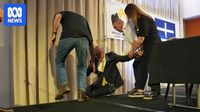In a dramatic turn of events this week, Australian Prime Minister Anthony Albanese experienced a literal stumble while addressing supporters in Cessnock, New South Wales. The incident occurred shortly after U.S. President Donald Trump announced a sweeping 10 percent tariff on Australian imports, a move that has sparked both political and economic backlash across the nation.
Albanese's fall, which he described as "embarrassing," happened as he stepped back to pose for a photo, only to find himself off the edge of the stage. Fortunately, he was quickly caught by aides and emerged unscathed, later joking about the incident on social media. "I stepped back one step. I didn't fall off the stage. Just one leg went down, but I was sweet," he reassured the public during an interview on ABC Radio Newcastle.
Meanwhile, the political atmosphere was charged as Albanese and his opposition counterpart, Peter Dutton, grappled with the implications of Trump's tariff announcement. The tariffs, which were part of what Trump dubbed "Liberation Day," have not only affected Australia but also imposed hefty charges on imports from countries like China and the European Union. The Australian territory of Norfolk Island was particularly hard hit, facing a staggering 29 percent tariff.
In response to the tariffs, Albanese unveiled a five-point plan aimed at mitigating the impact on Australian businesses and consumers. He stated, "This is not the act of a friend," criticizing the Trump administration's approach. The Prime Minister's plan includes strategies for negotiating with the U.S. and supporting affected industries.
Dutton, on the other hand, has been vocal in his criticism of Albanese, labeling him "weak" and "missing in action" regarding the tariff situation. During a press conference, Dutton suggested that a Coalition government would have better managed the relationship with the U.S. to avoid such tariffs. He emphasized the need for stronger communication and action to protect Australian interests.
Shadow Trade Minister Kevin Hogan echoed Dutton's sentiments, expressing confidence that the AUKUS alliance would endure beyond Trump's presidency. He argued that the Coalition could have negotiated exemptions for Australia similar to those achieved by Canada and Mexico. "I would have much more faith in the leadership of Peter Dutton than Anthony Albanese," Hogan stated during an appearance on Afternoon Briefing.
In Adelaide, Treasurer Jim Chalmers warned that the tariffs would slow global growth and increase prices worldwide. He has asked the Treasury Secretary to update the Commonwealth's economic modeling to assess the tariffs' impact. "This morning I have asked the treasury secretary to update the commonwealth's modelling, when it comes to the impact of these tariffs announced by the Trump administration," he said.
As the political landscape shifts, the Coalition has also made headlines with its stance on labor laws. Dutton confirmed that the Coalition would not repeal the Same Job, Same Pay laws, which allow labor hire employees to request equal pay with direct employees. This legislation, passed in 2023, has been a point of contention, with Labor arguing that the Coalition poses a threat to workers' rights.
Foreign Minister Penny Wong has taken a firm stance against Dutton's claims that he could have negotiated better terms with the U.S. regarding the tariffs. Wong dismissed Dutton's assertions as "delusional," emphasizing that no country had a better outcome than Australia under the current administration. "People know that President Trump wanted to put tariffs on all countries in the world," she remarked, highlighting the challenges faced by global leaders in negotiating with the Trump administration.
In a related development, the United Kingdom has launched a parliamentary inquiry into the AUKUS partnership, a trilateral security pact involving Australia, the U.S., and the UK. This inquiry comes in light of recent geopolitical shifts and concerns over the future of the agreement, especially following Trump's remarks during a press conference with British Prime Minister Keir Starmer.
As the election campaign heats up, Dutton has been urged to clarify his earlier comments about using defense and security as leverage in negotiations with the U.S. He suggested that Australia could leverage its critical mineral resources to negotiate better trade terms, stating, "There's huge market opportunity in the U.S., and we can have assurances, because we're a trusted partner." However, he faced scrutiny for the lack of details on how this would be achieved.
Amidst the political turmoil, Albanese's fall has become a metaphor for the challenges facing both leaders as they navigate a complex electoral landscape. With rising public scrutiny and the stakes higher than ever, the fallout from Trump's tariffs and the ensuing political discourse will likely shape the upcoming election.
As the campaign continues, both Albanese and Dutton will need to address not only the immediate concerns surrounding trade but also the long-term implications for Australia's economy and international relations. The next steps taken by both leaders in response to these challenges will be crucial as they seek to gain the trust and support of the Australian electorate.





